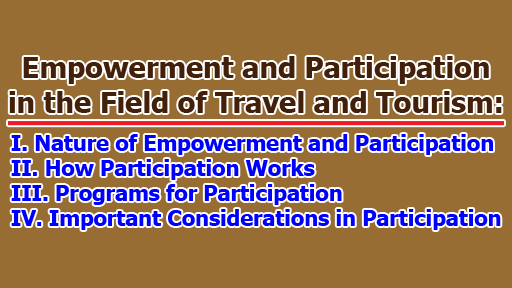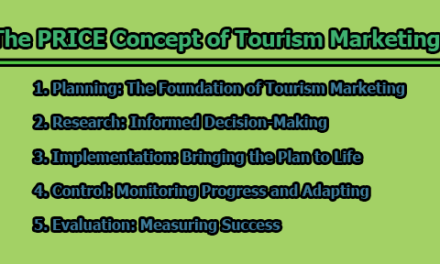Empowerment and Participation in the Field of Travel and Tourism:
In the vibrant and ever-evolving realm of travel and tourism, the concepts of empowerment and participation play pivotal roles in driving sustainable development and inclusivity. Empowerment refers to the process of equipping individuals and communities with the tools, knowledge, and agency to take control of their destinies and make informed decisions that positively impact their lives. In parallel, participation involves actively involving stakeholders in the decision-making processes, ensuring diverse perspectives, and fostering collaborative efforts towards common goals. By promoting empowerment and participation in the travel and tourism industry, we can create a more equitable and responsible sector that cherishes cultural diversity, preserves natural resources, and cultivates socio-economic advancement. In the rest of this article, we will explore the empowerment and participation in the field of travel and tourism.
I. Nature of Empowerment and Participation:
A. Empowerment in Travel and Tourism:
A.1 Definition and Concepts:
Empowerment in the travel and tourism industry encompasses a multi-dimensional process that involves providing individuals, communities, and various stakeholders with the tools, knowledge, and resources needed to take control of their destinies and actively participate in decision-making. It recognizes that these stakeholders are not passive recipients of tourism but key actors who should have a say in shaping the industry’s direction. Empowerment goes beyond the economic aspect of tourism and seeks to enhance social, cultural, and environmental aspects as well.
In the context of travel and tourism, empowerment can manifest in various ways, such as:
- Economic Empowerment: This involves enabling local communities and small businesses to access economic opportunities generated by tourism. It may include capacity building programs, training, and financial support to help them become active players in the tourism value chain.
- Cultural Empowerment: Preserving and promoting the cultural heritage of a destination is crucial for empowering local communities. By celebrating their traditions, customs, and art forms, communities can take pride in their cultural identity and share it with visitors.
- Environmental Empowerment: Empowerment in the context of the environment focuses on engaging stakeholders in sustainable tourism practices. By empowering local communities and businesses to adopt environmentally friendly initiatives, such as waste reduction, energy conservation, and wildlife conservation, destinations can ensure their natural resources are preserved for future generations.
A.2 Benefits of Empowerment:
The benefits of empowerment in the travel and tourism industry are far-reaching and have a positive impact on various aspects of tourism and destination development:
- Inclusive Growth: Empowerment helps to distribute tourism benefits more equitably, reducing socio-economic disparities and ensuring that local communities have the opportunity to prosper through tourism-related activities.
- Community Ownership: Empowered communities are more invested in tourism development and take ownership of their destinies. They are more likely to actively participate in shaping tourism policies, planning, and management.
- Sustainable Tourism: Empowerment encourages sustainable practices as empowered stakeholders have a vested interest in preserving their natural and cultural assets. This, in turn, fosters responsible tourism that minimizes negative impacts and promotes long-term sustainability.
- Enhanced Quality of Tourism Products: When local communities are empowered to showcase their unique culture and traditions, it leads to the creation of more authentic and engaging tourism products and experiences for visitors.
- Social Cohesion: Empowerment initiatives can strengthen social cohesion within communities by promoting a sense of unity, mutual respect, and shared responsibility for the well-being of the destination.
B. Participation in Travel and Tourism:
B.1 Definition and Concepts:
Participation in the travel and tourism industry refers to the involvement of various stakeholders, including local communities, businesses, government entities, NGOs, and tourists themselves, in the decision-making processes and planning of tourism activities. It recognizes that tourism development is a collaborative effort that requires the input and cooperation of all those affected by it.
Participation can take various forms, such as:
- Consultation: Consulting with stakeholders to seek their input and opinions on tourism-related matters, such as infrastructure development, policy formulation, and tourism marketing strategies.
- Collaboration: Collaborative partnerships between private sector businesses, local communities, and government bodies to jointly plan and execute tourism projects and initiatives.
- Co-creation: Involving stakeholders in the co-creation of tourism products and experiences, ensuring that they meet the needs and expectations of both visitors and local residents.
B.2 Importance of Participation:
Participation is vital in the travel and tourism industry for several reasons:
- Informed Decision-Making: Involving diverse stakeholders ensures that decisions are based on a comprehensive understanding of the various perspectives, needs, and concerns of all parties involved.
- Sustainable Tourism Planning: Participation fosters a more comprehensive and sustainable approach to tourism development. By involving local communities and other stakeholders, tourism projects are more likely to align with the destination’s long-term sustainability goals.
- Ownership and Commitment: Stakeholder participation leads to a sense of ownership and commitment to tourism development. When stakeholders are actively involved in decision-making, they are more likely to support and contribute to the success of tourism initiatives.
- Conflict Resolution: Tourism development can sometimes lead to conflicts between different stakeholders, such as residents and businesses. Through participation, these conflicts can be addressed proactively, fostering better communication and collaboration among all parties.
- Enhanced Visitor Experiences: Involving stakeholders in the planning process can lead to the development of tourism products and experiences that better cater to the desires and expectations of travelers, resulting in more satisfying and memorable experiences.
II. How Participation Works:
A. Stakeholders in the Travel and Tourism Industry:
Effective participation in the travel and tourism industry requires the active involvement of a wide range of stakeholders who have diverse interests, expertise, and perspectives. The key stakeholders involved in the decision-making process and shaping tourism activities include:
- Local Communities: Local residents are fundamental stakeholders as they are directly impacted by tourism development. Their engagement is crucial to ensure that their cultural heritage is respected, their livelihoods are enhanced, and any potential negative impacts are minimized. Engaging local communities empowers them to actively participate in tourism planning and management, enabling them to take ownership of their development and become beneficiaries of the industry.
- Private Sector: The private sector encompasses a variety of businesses, such as hotels, tour operators, restaurants, transportation services, and other tourism-related enterprises. These entities play a vital role in providing services and experiences to travelers. Engaging the private sector allows for collaborative efforts in promoting sustainable practices, enhancing visitor experiences, and contributing to the overall growth of the industry.
- Government Authorities: Government bodies at different levels, including local, regional, and national, have a significant role in regulating and guiding tourism activities. Their involvement is critical in creating and enforcing policies, providing infrastructure, ensuring safety and security, and overseeing environmental and cultural conservation measures.
- Non-Governmental Organizations (NGOs): NGOs often act as advocates for sustainable tourism practices, community development, and environmental conservation. Their expertise and commitment to social and environmental causes make them valuable partners in tourism projects that prioritize responsible and ethical practices.
- Tourists: Travelers themselves are an essential stakeholder group. Understanding their preferences, interests, and concerns is crucial for tailoring tourism products and experiences to meet their expectations. Tourists can also be involved in responsible tourism practices, such as supporting local businesses and respecting the destination’s cultural and environmental norms.
- Academia and Researchers: The academic and research community contributes to the industry by conducting studies, analyzing data, and providing insights into tourism trends, impacts, and best practices. Their findings help inform evidence-based decision-making and policy formulation.
B. Decision-Making Processes:
Involving stakeholders in the decision-making process requires a well-structured and transparent approach. Key components of effective decision-making processes in the travel and tourism industry include:
- Information Sharing: Providing stakeholders with comprehensive and accurate information about tourism plans, strategies, and potential impacts is essential. Transparent communication fosters trust and empowers stakeholders to make informed decisions.
- Consultation and Engagement: Actively involving stakeholders through consultations, workshops, focus groups, and surveys allows for open dialogue and the exchange of ideas. It provides a platform for stakeholders to express their opinions, concerns, and suggestions, ensuring that their voices are heard during the decision-making process.
- Collaboration and Partnerships: Collaborative decision-making involves joint efforts and partnerships among stakeholders. Engaging in collaborative initiatives fosters a sense of ownership and shared responsibility for the outcomes, leading to greater commitment and support for tourism initiatives.
- Inclusivity: Ensuring that the decision-making process is inclusive and diverse is crucial for representing the interests of all stakeholders involved. It is essential to give a voice to marginalized groups, women, and minority communities to promote equitable outcomes.
- Transparency and Accountability: Transparent decision-making processes build confidence among stakeholders. Clearly defining roles, responsibilities, and timelines, and holding stakeholders accountable for their commitments ensures that decisions are implemented effectively.
C. Collaborative Initiatives:
Collaborative initiatives in the travel and tourism industry bring together various stakeholders to work collectively towards shared goals. These initiatives are designed to foster cooperation, innovation, and sustainable development. Some examples of collaborative initiatives include:
- Destination Management Organizations (DMOs): DMOs serve as central coordinating bodies that bring together public and private sector stakeholders to jointly manage and develop a destination. They work towards promoting the destination, enhancing visitor experiences, and addressing challenges through collaborative planning and marketing efforts.
- Public-Private Partnerships (PPPs): PPPs involve collaborations between government bodies and private enterprises to jointly invest in and manage tourism infrastructure and services. These partnerships leverage the strengths of both sectors to deliver sustainable and efficient tourism solutions.
- Community-Based Tourism (CBT): CBT initiatives focus on empowering local communities to actively participate in tourism by offering authentic and culturally immersive experiences to travelers. These initiatives ensure that communities directly benefit from tourism activities, leading to inclusive and responsible tourism development.
- Sustainable Tourism Networks: Sustainable tourism networks bring together various stakeholders, including NGOs, businesses, and government agencies, to collaborate on sustainability projects and promote responsible tourism practices. These networks facilitate knowledge sharing and best practices for sustainable tourism development.
- Tourism Advisory Committees: Advisory committees composed of representatives from different stakeholder groups serve as platforms for ongoing dialogue and decision-making on tourism-related matters. These committees provide valuable input and recommendations to guide tourism policies and initiatives.
III. Programs for Participation:
A. Community-Based Tourism:
A.1 Case Studies of Successful Community-Based Tourism Projects:
- The Masaai Mara, Kenya: The Masaai Mara community in Kenya’s Maasai Mara National Reserve has embraced community-based tourism to protect their traditional lands and wildlife while generating income for the community. The Maasai people, known for their rich culture and distinctive way of life, have become active participants in the tourism industry by offering guided tours, traditional homestays, and cultural experiences. Through these initiatives, travelers gain insights into the Maasai’s ancient customs, rituals, and sustainable coexistence with wildlife. The revenue generated from community-based tourism is reinvested in community projects, such as schools, health centers, and environmental conservation efforts. This successful CBT project has not only empowered the Maasai people economically but also helped preserve their cultural heritage and the delicate ecosystem of the Maasai Mara.
- Kutch, India: The Kutch community in Gujarat, India, has implemented community-based tourism to showcase their vibrant culture and handicrafts. Kutch is renowned for its intricate embroidery, traditional art forms, and artisanal crafts. Through community-based tourism initiatives, travelers can participate in craft workshops, interact with skilled artisans, and experience the region’s unique cultural festivities. The Kutch community has established locally-run accommodations and guesthouses, allowing visitors to immerse themselves in the local way of life while supporting sustainable tourism practices. The success of this CBT project has revitalized the local economy and brought recognition to the region’s rich cultural heritage.
- Annapurna Conservation Area, Nepal: The Annapurna Conservation Area in Nepal is a prime example of successful community-based ecotourism. This region, renowned for its breathtaking mountain landscapes and diverse flora and fauna, is managed by local communities through the Annapurna Conservation Area Project (ACAP). Local communities are actively involved in managing trekking routes, providing hospitality services, and preserving the area’s natural resources. The ACAP has established revenue-sharing mechanisms, ensuring that a portion of the trekking fees and tourism income is reinvested in community development projects, such as schools, health posts, and conservation initiatives. As a result, the Annapurna Conservation Area not only offers awe-inspiring trekking experiences but also serves as a model for sustainable community-based ecotourism.
Community-based tourism projects emphasize the importance of community engagement and empowerment, showcasing how tourism can be a catalyst for positive change and sustainable development.
B. Ecotourism and Sustainable Tourism:
B.1 The Role of Eco-lodges and Sustainable Accommodation:
Ecotourism and sustainable tourism focus on minimizing negative impacts on the environment and promoting responsible travel practices. One key aspect of these approaches is the role of eco-lodges and sustainable accommodation, which are designed to align with environmental principles while offering travelers authentic and enriching experiences.
- Sustainable Design: Eco-lodges are constructed with environmentally friendly materials and methods, often using locally sourced, renewable resources. These lodges are designed to have minimal impact on the surrounding ecosystem, blending harmoniously with the natural landscape. The use of sustainable building materials and practices reduces the lodges’ carbon footprint and ecological disruption.
- Energy Efficiency: Eco-lodges prioritize energy efficiency by utilizing renewable energy sources, such as solar panels, wind turbines, or hydroelectricity. These sustainable energy solutions reduce reliance on fossil fuels, lower greenhouse gas emissions, and contribute to the preservation of the environment.
- Water Conservation: Sustainable accommodations implement water-saving measures, such as rainwater harvesting systems and water recycling technologies. These practices reduce water consumption and ensure the responsible use of water resources, particularly in regions facing water scarcity.
- Waste Management: Eco-lodges place a strong emphasis on waste reduction, recycling, and composting. By implementing effective waste management practices, these accommodations minimize their impact on local waste disposal systems and contribute to environmental conservation efforts.
- Local Engagement: Sustainable accommodations actively engage with local communities by employing local residents, sourcing food and supplies from nearby businesses, and supporting community development projects. This approach ensures that tourism revenue circulates within the local economy, contributing to the social well-being of the destination.
Eco-lodges and sustainable accommodations play a crucial role in promoting responsible tourism practices and raising awareness about environmental conservation among travelers. By choosing to stay in such accommodations, tourists actively support sustainable tourism initiatives and contribute to the preservation of natural and cultural heritage.
C. Volunteer Tourism (Voluntourism):
C.1 Evaluating the Impact of Volunteer Tourism Programs:
Volunteer tourism, commonly known as voluntourism, involves travelers participating in various volunteer activities while visiting a destination. These activities can range from conservation projects and community development initiatives to healthcare support and wildlife rehabilitation. While voluntourism has gained popularity for its potential to contribute positively to local communities and conservation efforts, evaluating its impact is crucial to ensuring responsible and sustainable practices.
- Positive Impacts: Voluntourism programs have the potential to bring about positive outcomes, such as providing much-needed assistance to communities in need, supporting conservation initiatives, and fostering cultural exchange between volunteers and local residents. These programs can also create awareness about social and environmental issues, encouraging volunteers to advocate for sustainable practices in their home countries.
- Challenges: However, voluntourism is not without its challenges. Some programs may have short-term or superficial impacts, leading to dependency on foreign aid rather than promoting sustainable community development. In some cases, volunteer projects might not align with the actual needs and priorities of the local community, leading to limited long-term benefits.
- Responsible Voluntourism: To ensure that voluntourism programs have a positive and lasting impact, it is essential to focus on responsible voluntourism practices. This involves collaborating with local communities to identify their genuine needs and priorities, promoting skills-based volunteering, and supporting locally-led initiatives that empower communities in the long run. Responsible voluntourism programs should aim to contribute to sustainable development goals and respect the cultural integrity of the destination.
- Monitoring and Evaluation: Regular monitoring and evaluation of voluntourism programs are crucial to assess their effectiveness and ensure that they align with the destination’s sustainability goals. Transparency in program operations and impact reporting is essential to maintain accountability and build trust among stakeholders.
IV. Important Considerations in Participation:
A. Ensuring Inclusivity and Diversity:
Involving a diverse range of stakeholders and ensuring inclusivity are essential considerations in promoting effective participation in the travel and tourism industry. To achieve inclusivity, the following aspects should be taken into account:
- Representation: Inclusivity starts with representation. It is essential to involve all relevant stakeholder groups in the decision-making process. This includes local communities, indigenous peoples, women, minority groups, small businesses, NGOs, academic institutions, and government agencies. Creating diverse and inclusive advisory committees or forums can ensure that various perspectives are considered in tourism planning and development.
- Empowering Marginalized Groups: Inclusivity goes beyond mere representation; it involves empowering marginalized groups to actively participate in tourism development. This empowerment can be achieved through capacity building programs, providing access to education and training, and supporting entrepreneurial ventures. By empowering these groups, they become active contributors to tourism activities and decision-making processes.
- Addressing Language and Communication Barriers: Language barriers can hinder effective participation. Providing information and conducting consultations in local languages can enhance communication and enable stakeholders to express their views and concerns more effectively. Interpretation services can also be utilized to ensure that all participants understand the discussions and can actively engage in the process.
- Cultural Sensitivity: Tourism initiatives must be culturally sensitive and respectful of local traditions, customs, and practices. Cultural impact assessments should be conducted to understand how tourism activities may affect the local culture and heritage. Collaboration with local cultural experts and community representatives can help identify appropriate ways to incorporate cultural elements into tourism offerings.
B. Fostering Environmental Stewardship:
Environmental stewardship is crucial for sustainable tourism development. To foster environmental stewardship through participation, the following considerations should be taken into account:
- Conservation Partnerships: Collaboration with local environmental organizations, conservation groups, and community-based initiatives is vital for promoting environmental stewardship. By partnering with these entities, tourism stakeholders can contribute to conservation efforts and support initiatives that protect natural resources and wildlife habitats.
- Sustainable Practices: Sustainable tourism practices should be integrated into all aspects of tourism operations. This includes adopting energy-efficient technologies, implementing water-saving measures, promoting waste reduction and recycling, and minimizing single-use plastics. Sustainable tourism certifications can be pursued to showcase a commitment to responsible environmental practices.
- Environmental Education: Raising awareness about environmental conservation is essential for both tourists and local communities. Education programs can inform tourists about responsible behavior, such as avoiding littering, respecting wildlife, and adhering to designated trails. For local communities, environmental education can emphasize the importance of preserving natural resources and ecosystems for future generations.
- Climate Change Resilience: Climate change poses significant challenges to tourism destinations. Developing climate change adaptation strategies and building resilience in tourism operations can help mitigate the impact of changing environmental conditions. This may include implementing eco-friendly infrastructure, diversifying tourism products, and promoting off-season travel to reduce pressure on resources.
C. Promoting Socio-Economic Development:
Participation in the travel and tourism industry should focus on promoting socio-economic development that benefits local communities and enhances their well-being. Key considerations include:
- Equitable Distribution of Benefits: Tourism revenues should be distributed equitably among local communities to promote inclusive growth. This can be achieved through revenue-sharing mechanisms, direct investment in community projects, or establishing community-based tourism enterprises that involve local residents in revenue generation.
- Capacity Building: Capacity building programs can empower local communities with the skills and knowledge needed to participate in various tourism-related activities. This may include training in hospitality, tour guiding, handicraft production, and sustainable agriculture. Building local capacity enhances the quality of tourism products and services while fostering economic independence.
- Sustainable Livelihoods: Tourism initiatives should be designed to create sustainable livelihood opportunities for local communities. This involves promoting responsible tourism practices that preserve cultural heritage and natural assets while generating income for the local population. Supporting locally-owned and operated businesses strengthens the economic resilience of communities.
- Cultural Preservation: Cultural preservation should be prioritized in tourism development. By promoting cultural experiences and supporting local artisans, musicians, and performers, tourism can contribute to the preservation and celebration of traditional culture. Additionally, tourism operators should be encouraged to adhere to codes of conduct that respect local customs and protect sacred sites.
D. Addressing Challenges and Potential Pitfalls:
While participation in travel and tourism brings many benefits, it also comes with challenges and potential pitfalls that require careful consideration:
- Over-tourism: Over-tourism can lead to negative impacts on destinations, including environmental degradation, cultural commodification, and strained infrastructure and resources. Implementing visitor management strategies, regulating visitor numbers, and promoting responsible travel behavior can help mitigate the effects of over-tourism.
- Dependency: Over-reliance on tourism can create dependency on external markets and economic fluctuations. Encouraging diversification of income sources, such as agriculture, handicrafts, and other industries, can reduce the vulnerability of communities to fluctuations in tourism demand.
- Inadequate Planning: Proper tourism planning is crucial to avoid haphazard development and potential negative impacts. Comprehensive destination management plans that consider carrying capacity, environmental impacts, and community needs are essential for sustainable tourism development.
- Cultural Appropriation: Cultural appropriation can occur when tourism commodifies cultural practices for commercial gain without appropriate respect and understanding. To address this, tourism operators should collaborate with local communities and cultural experts to ensure that cultural experiences are authentic, respectful, and mutually beneficial.
- Displacement and Gentrification: Tourism development can lead to the displacement of local residents due to increased land and property values. Strategies such as community land ownership, zoning regulations, and inclusive urban planning can help protect communities from gentrification and ensure they benefit from tourism development.
- Exploitative Practices: Unethical practices such as wildlife trafficking, child labor, and unfair labor conditions can tarnish the reputation of tourism destinations. Implementing strict regulations, adhering to ethical codes of conduct, and promoting responsible tourism practices are essential in combating exploitative practices.
- Balancing Economic Growth and Environmental Conservation: Striking a balance between economic growth and environmental conservation is crucial. Responsible tourism practices should prioritize sustainability and conservation to ensure that tourism growth does not compromise the natural assets that attract visitors in the first place.
In conclusion, empowerment and participation are fundamental pillars in the field of travel and tourism, transforming the industry into a force for positive change and sustainable development. Through community-based tourism initiatives, local communities are empowered to actively engage in tourism planning and benefit directly from the economic opportunities it brings. This participatory approach not only preserves cultural heritage and natural resources but also fosters a sense of ownership and responsibility among residents. Moreover, sustainable tourism practices, such as eco-friendly accommodations and responsible tourism campaigns, strike a delicate balance between tourism development and environmental conservation, ensuring the longevity of tourism destinations. Additionally, volunteer tourism provides a platform for cultural exchange and community development, enabling travelers to contribute meaningfully to the places they visit. However, addressing challenges like over-tourism, cultural appropriation, and dependency on tourism income remains essential in fostering a responsible and inclusive travel and tourism industry. By embracing empowerment, promoting inclusivity, and prioritizing environmental and socio-economic considerations, the industry can shape a future where tourism enriches the lives of both travelers and local communities while safeguarding the world’s natural and cultural treasures.
FAQs:
What is empowerment in the context of travel and tourism?
Empowerment in travel and tourism refers to the process of enabling local communities and stakeholders to actively participate in tourism development and decision-making. It involves providing them with the knowledge, skills, and resources necessary to take ownership of tourism initiatives, preserving their cultural identity and natural assets while benefiting economically from the industry.
How does participation work in the travel and tourism industry?
Participation in the travel and tourism industry involves involving various stakeholders, including local communities, government agencies, non-governmental organizations, tour operators, and tourists, in the planning, development, and management of tourism activities. Participatory approaches prioritize collaboration, inclusivity, and dialogue, ensuring that the interests and perspectives of all stakeholders are considered in the decision-making process.
What are the benefits of empowerment in travel and tourism?
Empowerment in travel and tourism yields several benefits. It promotes sustainable development by involving local communities in the conservation of natural resources and cultural heritage. It leads to economic growth and poverty reduction, as tourism revenues are reinvested in community projects and support local businesses. Additionally, empowered communities take pride in their culture and traditions, leading to authentic and enriching tourism experiences for travelers.
Why is participation important in the travel and tourism industry?
Participation is crucial in the travel and tourism industry as it fosters a sense of ownership and responsibility among stakeholders. By involving local communities, it ensures that tourism initiatives are aligned with their needs and aspirations, avoiding negative impacts such as cultural commodification and environmental degradation. Moreover, participation enhances the quality of tourism products and services, leading to more meaningful experiences for travelers.
What are some programs for participation in the travel and tourism industry?
There are several programs that promote participation in the travel and tourism industry. Some examples include community-based tourism, where local communities actively engage in tourism planning and management; ecotourism and sustainable tourism, which focus on responsible environmental practices; and volunteer tourism (voluntourism), where travelers participate in community development or conservation projects during their visit.
How does community-based tourism benefit local communities?
Community-based tourism benefits local communities in various ways. It provides them with economic opportunities through tourism-related activities, generating income and reducing poverty. It also preserves cultural heritage, as tourists engage in authentic cultural experiences. Additionally, community-based tourism fosters environmental conservation, as communities have a vested interest in protecting their natural resources and ecosystems.
What are some important considerations in promoting participation in travel and tourism?
Important considerations in promoting participation in travel and tourism include ensuring inclusivity and diversity, fostering environmental stewardship, promoting socio-economic development, and addressing challenges and potential pitfalls. Inclusivity involves involving all relevant stakeholders, while environmental stewardship focuses on sustainable practices to protect natural resources. Socio-economic development aims to distribute tourism benefits equitably, and addressing challenges ensures responsible and sustainable tourism practices.
How can travelers actively participate in sustainable tourism?
Travelers can actively participate in sustainable tourism by choosing eco-friendly accommodations, supporting local businesses and artisans, respecting local cultures and customs, and engaging in responsible wildlife interactions. They can also participate in community-based activities and conservation projects, while adhering to guidelines that minimize their impact on the environment and local communities.
References:
- UNWTO (World Tourism Organization). (2004). Empowerment of Local Communities in Sustainable Tourism Development.
- Scheyvens, R. (2002). Tourism for Development: Empowering Communities. Pearson Education Limited.
- Hall, C. M., & Page, S. J. (Eds.). (2014). The Geography of Tourism and Recreation: Environment, Place, and Space (4th ed.). Routledge.
- Aref, F., Redzuan, M., & Shaharuddin, N. (2017). Assessing Empowerment Levels in Community-Based Tourism Development: A Case Study of Homestay Programmes in Malaysia. Journal of Sustainable Tourism, 25(8), 1137-1154.
- Baum, T. (Ed.). (2016). The Handbook of Tourism and Hospitality Management. CABI.
- Honey, M. (2008). Ecotourism and Sustainable Development: Who Owns Paradise? (2nd ed.). Island Press.
- United Nations. (2017). Transforming Our World: The 2030 Agenda for Sustainable Development.
- Jamal, T., & Getz, D. (Eds.). (2009). Collaboration and Partnerships in Tourism Development. Routledge.
- Holden, A. (2005). Environment and Tourism (2nd ed.). Routledge.
- Fennell, D. A. (2015). Ecotourism (4th ed.). Routledge.

Library Lecturer at Nurul Amin Degree College










